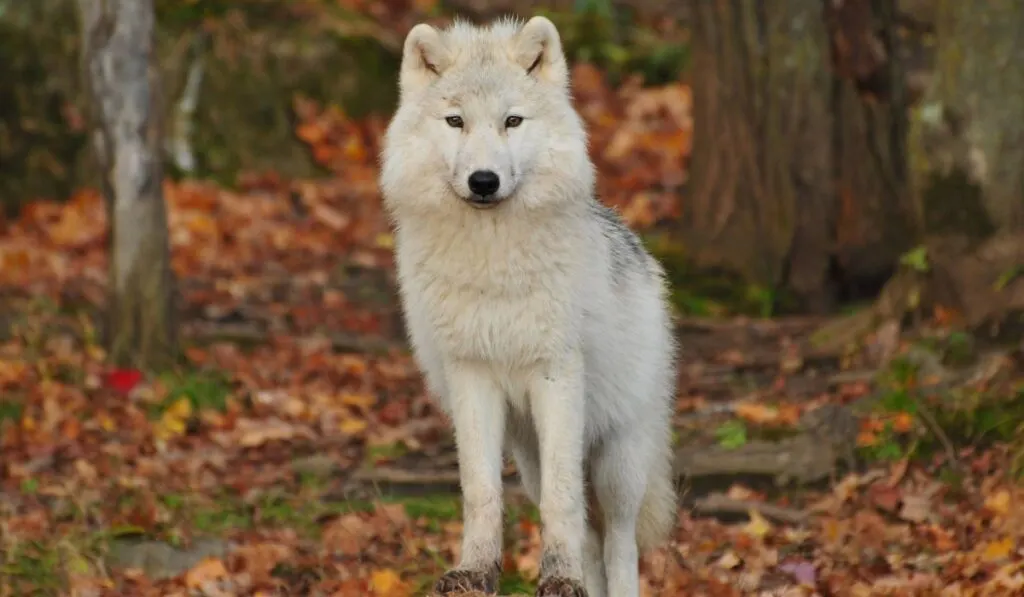It’s important to stress that any form of animal fighting is inhumane, unethical, and illegal. This theoretical discussion is purely academic and should not be used to endorse or encourage any harmful behavior towards animals.
Still, we get many messages about pitbulls, wolves, and who would win if they were to face off.
We’ve had many owners in parts of Canada and Alaska that have Pitbulls and are worried about a possible encounter with a wolf, sparking this question.
In short, a wolf would almost always win against a pitbull. Unless the wolf was already injured, or you have TWO pitbulls, it would be easy for a wolf to take a Pitbull. Wolves are considerably bigger, stronger, faster, and have a bite force 4 or 5 times that of a Pitbull.
Wolf vs Pitbull: Who Would Win?
When comparing a wolf and a Pitbull, there are key differences that might influence the outcome of a hypothetical encounter.
Wolves are wild animals adapted to hunting and surviving in harsh conditions, while Pitbulls are domestic dogs bred for specific purposes, including companionship.
In a direct physical confrontation, a wolf would likely have the advantage due to its larger size, greater bite force, and survival instincts.
In terms of physical strength and adaptability, a wolf would likely have an edge over a Pitbull.
However, this is purely theoretical and should not be tested in reality.

Who Has a Stronger Bite?
Wolves have one of the strongest bite forces among all canine species, reaching up to 1,200 pounds per square inch (PSI). In contrast, Pitbulls have a bite force of around 235 PSI.
In terms of bite force, wolves significantly outperform Pitbulls. It would be no match for a Wolf if they was to get a bite off.
Is a Wolf or Pitbull More Aggressive?
Wolves are wild animals with strong survival instincts. They can be aggressive when hunting or defending their territory. Pitbulls, being domestic dogs, can also show aggression, especially if poorly socialized or trained. However, aggression levels can vary widely among individual animals in both species.
Both wolves and Pitbulls can exhibit aggression, but it’s important to note that wolves are wild animals with strong survival instincts.
Where do wolves roam in the wild? – source
Who is a Better Guard Dog: Wolf or Pitbull?
As domestic dogs, Pitbulls can make good guard dogs. They can be trained to protect their owners and property, and they can also form strong bonds with their human families.
On the other hand, wolves are wild animals and are not suitable as pets or guard dogs. They are not easily trainable and may pose a threat to humans and other pets.
Pitbulls, being domestic dogs, would be far better guard dogs than wolves.

Is a Wolf Stronger Than a Pitbull?
In terms of physical strength, a wolf is likely stronger than a Pitbull. Wolves are larger, heavier, and have a more muscular build compared to Pitbulls. They are adapted for survival in the wild, which requires considerable strength and stamina.
Wolves are typically stronger and more powerful than Pitbulls.
Which is Better: Wolf or Pitbull?
When comparing wolves and Pitbulls in terms of suitability as pets, Pitbulls are the clear choice. They are domestic dogs that have been bred to live alongside humans. They can be trained, socialized, and integrated into family life. Wolves, on the other hand, are wild animals that are not suited to life as pets.
Pitbulls, as domestic dogs, are more suitable as pets than wolves.
In conclusion, in a hypothetical confrontation, a wolf’s size, strength, and survival instincts could give it an advantage over a Pitbull. However, when it comes to living alongside humans as pets or guard dogs, Pitbulls are the far better choice.
